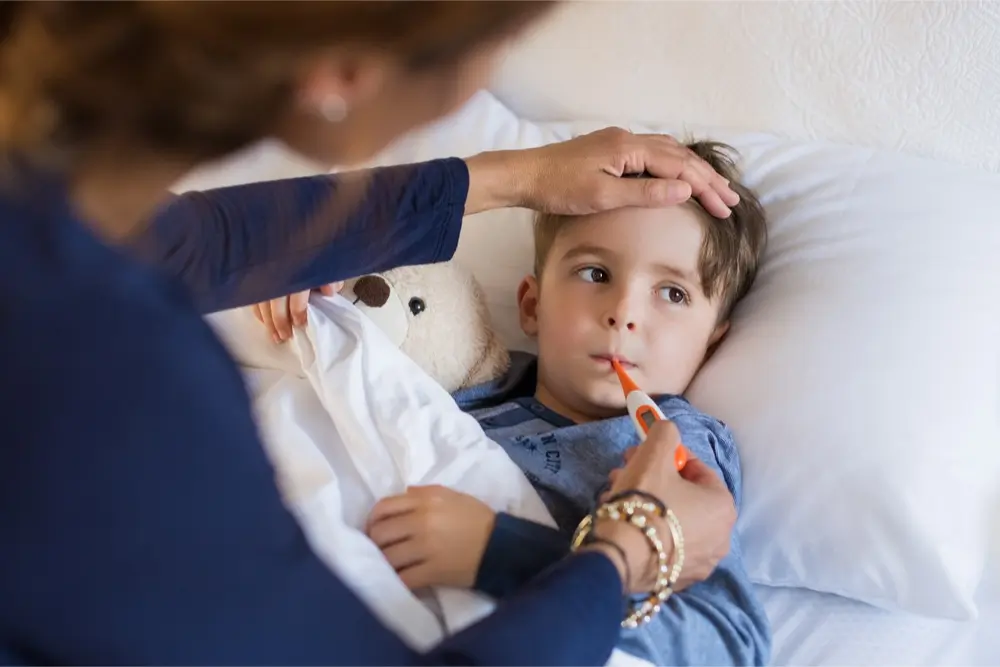Scarlet Fever- symptoms, causes & treatment
What is Scarlet Fever?
- Scarlet Fever was once a very common illness, and used to be a major cause of death in childhood.
- With improvements in living conditions and hygiene, as well as the availability of antibiotics, it’s now much less frequent and is easily treatable if it occurs.
- However, cases still crop up, and there can be outbreaks in schools- so it’s worth being aware of the symptoms of scarlet fever, particularly as the delayed complications of untreated infection can be serious.
Who gets Scarlet Fever?
- Scarlet Fever usually occurs in children younger than 10 years old, peaking around the age of 4.
- It’s unusual for adults to get it
What causes Scarlet Fever?
- Scarlet Fever is caused by bacteria known as Group A Streptococcus, often referred to as “Strep” for short.
- Streptococcal bacteria located in the throat release a toxin into the bloodstream, and that leads to the characteristic rash.
What are the symptoms of Scarlet Fever?
Symptoms of Scarlet Fever include:
- Fever (high temperature)
- Sore throat
- A red rash on the face, chest and abdomen which tends to have a rough “sandpapery” feel to it (not everyone gets the rash- only those who are sensitive to the Strep toxin mentioned above).
- Some people experience peeling of their skin after the initial red rash has faded (this looks like when your skin peels following sunburn).
- A prominent red appearance of the tongue, with small white spots. This is referred to as “strawberry tongue”. In some cases the tongue may become swollen after a few days.
How is scarlet fever diagnosed?
- Usually a doctor will recognise the typical symptoms of scarlet fever
- Sometimes a throat swab will be taken to check for Streptococcal infection in the throat
- A blood test can also help to confirm the diagnosis
How do you get Scarlet Fever?
- Coughs and sneezes can spread the bacteria, as can contact with surfaces that an infected person has touched- e.g. towels, baths, clothes or bedclothes.
- Symptoms take 2-4 days to develop following exposure.
- Children with scarlet fever should avoid school or childcare for 24 hours after starting antibiotics.
- Once you get scarlet fever, you develop immunity, so you’re unlikely to get it more than once. However, exposure to a different strain of the bacteria could lead to a recurrence.
- There is no evidence that scarlet fever is harmful in pregnancy
What is the treatment of scarlet fever?
- Antibiotics are the treatment of scarlet fever, and a full course should be taken- usually for 10 days.
- To prevent complications, it’s important that the full course of antibiotics is taken, even if symptoms improve after the first few doses.
- Scarlet fever generally gets better within a week, even if no antibiotics are taken- but antibiotics are still advised, as they prevent later complications.
- Plenty of fluids are advised, and Paracetamol can be taken as required for pain and fever.
What is “scarlatina”?
Scarlatina is just a term sometimes used by people to refer to scarlet fever if the symptoms are mild- but it is the same illness, and should be treated the same way.
What are the complications of scarlet fever?
Most people do not get complications, particularly if antibiotics are taken. Early complications of scarlet fever can include:
- Ear infection
- Sinus infection
- Pneumonia
- Meningitis
- Throat abscess
There can be delayed complications if antibiotics are not taken- some of these can be serious, and may only arise years later:
- Glomerulonephritis- this is an inflammatory condition of the kidneys, and may occur years later. It can be serious, and may lead to high blood pressure and kidney failure.
- Rheumatic Fever- this is a serious condition affecting the heart, and like glomerulonephritis, may occur many years after the original infection.
Taking the full course of antibiotics for scarlet fever helps to prevent these complications.
If you have any concerns about Scarlet Fever, speak to your doctor.

Getting a Mental Health Care Plan in Australia: Your Guide
Getting a Mental Health Care Plan in Australia: Your Guide Mental health matters—and if you’re feeling overwhelmed, anxious, or down, a mental health care plan can help. But what is it, and how do [...]
UTI Symptoms and Treatment: What You Need to Know
UTI Symptoms and Treatment: What You Need to Know Urinary Tract Infections (UTIs) are common, uncomfortable, and often disruptive. But what exactly are the signs to watch for, and how can you get relief [...]
Free Mental Health Care Plan Online | Bulk-Billed by Qoctor
Free Mental Health Care Plan Online | Bulk-Billed by Qoctor Discover how to get a free, bulk-billed Mental Health Care Plan (MHCP) in Australia through Qoctor's telehealth service. Accessing [...]





